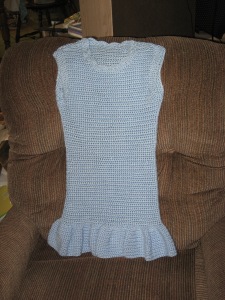A helpful hint
Posted on: February 2, 2009
Here’s a tip: Don’t eat taffy when your teeth are already trying to fall apart. Things are shaping up for a repeat of the summer when Meinmann said “The dentist called today. He wanted to thank you for his new Mercedes.”
- In: links
- Leave a Comment
And that’s true of both Republicans and Democrats. But here’s a breath of fresh air.
And here’s some more sense on the subject of multiculturalism and tolerance.
And yes, I know that starting sentences with a conjuction is a questionable practice. But I’m on a roll, and I just don’t know what’s gotten into me tonight.
Fun links
Posted on: September 15, 2008
- In: links
- Leave a Comment
Can’t get your kids to listen to you? I bet this would work, but not all of us have the talent.
Do you miss Frogger and Space Invaders? Get your fix here.
If you’re stuck for April Fool’s ideas next spring, try this.
What’s really frightening about this is that these people probably have drivers’ licenses. But it’s still funny.
Gourmet crochet. Need I say more?
It’s Works for Me Wednesday over at Rocks in My Dryer, and here’s what works for me – having my kids entertain themselves online by learning to read. Starfall is a free website that starts with letters and the sounds they make, and moves up to words, then complete stories for kids (There’s even one about the Trojan horse!). My children (ages 5 and 3) love it. I won’t tell you the computer taught them to read, because I’ve done a fair bit about it myself, along with my husband and our parents. But the kids love it, and it’s phonics, so it’s more profitable than some of the other choices.
If you’d like more great ideas than you can shake a stick at, go see Rocks in My Dryer.
This is a wastebasket (for non-icky things) to go under my computer desk. It’s tapestry crochet, made by holding 3 strands of yarn together, but only letting two of them show at any given time, and varying which two to get the hearts pattern.
This began life as a sweater for Cinderella (now 5yo), designed to be the same size as a t-shirt that fits her perfectly. This was the first time I have made up a crochet pattern myself, so I’m not sure what happened, but it ended up being way, way too long. So I decided to add a ruffle and make it into a dress. But now the whole thing is heavy enough that the stiches at the top get pretty stretched out. So I guess she’ll be wearing it over something.
These are mesh bags made by holding two strands of crochet thread together. I’m pretty sure they were the same size at one time, so it’s weird that the pink one is now bigger. Maybe it’s because that one holds pool toys. Anyway, here’s the link for the pattern. About.com has all kinds of wonderful crochet patterns.
our “terrible” economy
Posted on: August 30, 2008
I don’t usually write about politics, and I’m usually not that interested either, but I just have to say this: I have had it up to here with hearing about how we live in such hard times. Yes, it qualifies as hard times if you’re one of the almost 6% who can’t find a job. But hard times for the whole country? That’s when *lots* of people can’t find a job, like in 1933, when unemployment was 25%. The Great Depression was hard times, and I would say the Carter years were as well. Right now, we just don’t have it that bad.
Works for Me Wednesday – Popovers!
Posted on: July 9, 2008
I was going to post this last week for the 5-ingredients version of WFMW, but since that was 2 days before my daughter’s birthday, it just didn’t happen. Now that I have recovered, I am sharing with you the easiest recipe that ever tasted good, as far as I’m concerned. (We’ll see what I think after I check out all of last week’s WFMW links.)
Popovers: (makes 16-18, depending on how full you fill the muffin cups)
Preheat the oven to 425 F.
2 cups flour
1 tsp. salt
6 eggs (no need to beat them first)
2 cups milk
2 Tbsp. oil
Start with the flour and salt, so you can get them well mixed first. Then add everything else, and mix it with an electric mixer/beater. DO NOT use a fork! I tried it once and got very lumpy batter. Beat it until the flour is combined. It should be the consistency of thick cream.
Spray 18 standard-size muffin cups with cooking spray *with flour* (it sticks without the flour). Fill the muffin cups about 3/4 full of the batter. Bake for 30-35 minutes. Don’t open the oven during baking; that can make them collapse. When they’re done, they’ll be nicely brown on the top with a hollow space in the middle of each one.
I like to eat them plain with lots of butter, and with 6 eggs in the recipe, they have a fair bit of protein. But you can add more by stuffing them with cheese, tuna salad, chicken salad, egg salad, or my favorite stuffing: deli turkey and avocado slices.
Notes:
The original recipe only called for 4 eggs, but I sneak protein into my kids any way I can, and we think they’re even better with 6 eggs anyway.
They make popover pans for this purpose. I don’t room in my kitchen for single-purpose implements, and muffin tins work just fine.
I tried it once with soy milk (temporary lactose intolerance) and they didn’t rise properly. I have no idea why, but they turned out to be really eggy muffins. Good, but not the same as proper popovers.
It’s funny – this is a lot of words for an “easy” recipe, but it really is easy. I have the whole thing in my head, and I can do it all in the 6 minutes it takes my oven to preheat.
Check out what works for other people at Rocks in My Dryer!
Thoughts on Classical Education
Posted on: July 7, 2008
I’m collecting my homeschooling thoughts again, this time on Classical education. A few years ago, I read several of Douglas Wilson’s books on Classical education, and I thought I was completely sold on it. But after reading and thinking about it some more, I’m not so sure. Part of the problem is one of definition. Just what is Classical homeschooling, anyway? The word gets thrown around a lot, and it seems to mean different things to different people, and the same is true of the word “trivium.”
I’ve been reading Teaching the Trivium by Harvey and Laurie Bluedorn, and it’s been very helpful in the thinking process. They set out several definitions:
1. The Formal Trivium in the classical sense refers to the subjects of grammar, logic, and rhetoric (and they were taught in that order). We moderns are supposed to learn the grammar of Latin or ancient Greek as well as English.
2. The Applied Trivium refers to an educational model or philosophy.
3. The Trivium method for teaching subjects is based on the philosophy of the Applied Trivium, and is explained in #4.
4. The Trivium model of Child Educational Development refers to the idea (I think this was developed by Dorothy Sayers) that children’s mental development passes through 3 stages, each of which is ideally suited to learning in a certain way. The grammar stage is when the mind is eager to soak up facts, so this is when children are supposed to learn grammar, both in English and foreign languages, as well as the facts of all of the other subjects – dates, definitions, lists of presidents, etc. The logic stage is when the mind is ready to analyze, so this is when they learn logic, and in the other subjects we scrutinize the relationship between those facts that were soaked up in the previous stage. In the rhetoric stage, the mind is ready for creative expression, so we teach writing and speaking, organizing one’s thoughts, etc. It is also supposed to be when the child is ready for practical application of his knowledge of the other subjects.
Another thing that often seems to go with Classical education (though not necessarily) is a spiral approach to the study of history. You start in 1st or 2nd grade with the study of the ancients. In the Christian version, you start with Genesis. At the beginning, kids aren’t ready for in-depth study, so you read children’s books about the relevant time period, and build models, and other grade-school type things. You take 4 or 5 years to get to the present, and then you start over again with ancient times. The material is familiar from the first time through, but you study more in depth this time. Different versions of this spiral have 2 or 3 repetitions.
So what do I think of Classical education? In the wrong order:
1. Grammar and Rhetoric (which refers to writing and speaking) are necessary for anyone who wants to be educated, and I don’t think I know anyone who disagrees with this. Logic is less universally required, but I think we would all be better off with some formal training in logic.
The ancient languages are a sticking point. Sure, there are lots of good reasons for learning Latin and/or ancient Greek, and I think languages are fun, so why not? But at a gut level, I just can’t get convinced that it’s a big deal to learn anything but English. All the reasons would take up a post in themselves.
4. The Trivium model of children’s mental development sounds pretty good, and it might be true. My own experience in school verifies it in part. In late grade school (the grammar/fact), I remember wanting to soak up facts about my favorite subjects (science and geography), and my main frustration with school was that they just didn’t give them to me fast enough. But I had no interest whatsoever in history, and most people I’ve talked to hated it for the same reason I did – it was just a dry list of facts that none of us cared about. That doesn’t fit with the model, which says children are supposed to love memorizing any old facts. In junior high (the logic/analysis stage), I did analyze things a lot. I’ve never stopped. In my late teen years (the rhetoric/expression stage), I finally learned how to write, and discovered that I liked it! Starting in 5th grade or so, I had developed a phobia of any and all writing assignments because I could never organize my thoughts and get them on paper. This lasted until my freshman year in college, when something clicked.
(Incidentally, this supports something I keep reading in books supporting Classical education. The claim is often made that when we try to get children to do something that their brains just aren’t ready for, we cause all kinds of problems, most of which get labeled as some kind of learning disability that no one ever heard of a hundred years ago. The example most often given is this: If you try to teach a child to read before s/he is ready, you can cause dyslexia. There isn’t really something wrong with the kid, but the stress of trying so hard and failing anyway gives the kid a complex, and pretty soon s/he really does have a problem. In my case, the explanation would be that I just wasn’t ready for the level of writing that was expected of me, my teachers’ insistence that I do it anyway is what caused the problem. Personally, I think that if someone had just taught me how to organize my thoughts for writing instead of just assuming that I already knew, things probably would have been just fine. Argh.)
Anyway, back to the present. My plan is to go forward assuming the theory is more or less correct. But I will watch to see is my observations of my children go along with the theory or not. Whether or not to use a spiral approach to history is my husband’s problem, since he’s going to be teaching history. As for the other subjects…
It dawned on me last week that the Classical approach to education does not prescribe a method of instruction, and that’s part of why I feel so at sea when I contemplate all this. The Charlotte Mason approach works fine, or you can do unit studies, or you can get textbooks and workbooks, as long as they are geared toward the appropriate developmental stage. So I still have to figure out a method after all.
Getting ready to do school at home
Posted on: May 14, 2008
OK, I’m paying attention to my computer again. And I’m getting myself organized to start homeschooling in July. I think I’m actually going to collect my thoughts here. That seems odd – collecting your thoughts on a blog – but it’s harder to lose than a notebook. That’s a big problem for me.
Anyway, our regular subjects are going to be Bible, math, art, and phy ed. We already have storytime first thing in the morning. I stay in bed until Cinderella gets up and joins me in my bed, and then we read stories until we’re too hungry to continue. It’s the only time of day that she wants to sit still for books. So we read, and talk about the stories, and it’s a great time. (BTW, I updated my “About me” page to explain the pseudonyms. Cinderella is my 4yo daughter.)
I’m exploring our options for phy ed, and I have mostly figured out how math is going to work, but I still need a plan for Bible and art. Does anyone have resources to recommend for those subjects?
You may have noticed that reading and writing instruction are not included. That is because Cinderella can sound out most of the words in any kids’ book (though she needs help with some vowel combinations), and what is left is just to practice. I encourage that in bits and pieces throughout the day, which I think is more effective (and fun) than one concentrated burst of effort. I am not including writing practice right now because all of the motor skills that would be practiced by writing letters can also be practiced by drawing and painting. Cinderella is such an artistic child that the practice will be a lot more fun that way.
Once I get the plan for our main subjects figured out, I’m toying with doing science experiments once a week, and I’m thinking about adding geography eventually, and I want to find out if I think unit studies would be both fun and useful. And I’m trying to decide if I want to do some kind of Letter-of-the-week thing; both kids already know the alphabet, so I’m not sure how useful it would be.
P.S. I’m also considering throwing in Spanish.
But you thought I did, didn’t you? Fall gets crazy around here – we have 2 birthdays and an anniversary the same week as Thanksgiving, and I get worn out just thinking about it starting about the first of November.
I just got the best free massage money can’t buy. I dared to lay down on a bed, and my two kids (roughly 35 pounds each) climbed all over me for 15 minutes. I feel like a new woman. Alas, it all ended when one pushed the other and the other got hurt.







Recent Comments